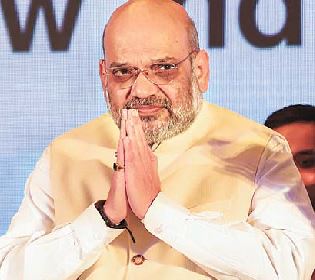
Sensitive to industry concerns: Shah
- October 24, 2019
- 0
Sensitive to industry concerns: Shah
Fiscal Puritanism must not be allowed to sacrifice growth, caution experts
In a bid to allay apprehensions of India Inc, Home Minister Amit Shah said the government was looking into the “difficulties” faced by industries, even as several experts suggested pumping in more money into the sagging economy. “I understand your difficulties, your apprehensions. There may be uncertainties. But it is a sensitive and non- corrupt government,” Shah said at an All India Management Association (AIMA) event here. He also attributed some of the challenges faced by businesses to the global economic slowdown.
 Speaking on the reforms initiatives, Shah said the initial difficulties faced in systems like the goods and services tax regime would smoothen out soon. “…at the end reforms bring the larger good,” the minister said, as he asked the AIMA and other industry bodies to come up with suggestions to give industries a boost. “India has to be a $5 trillion economy by 2024 and it is a certainty,” he said, urging business leaders to build national confidence.
Speaking on the reforms initiatives, Shah said the initial difficulties faced in systems like the goods and services tax regime would smoothen out soon. “…at the end reforms bring the larger good,” the minister said, as he asked the AIMA and other industry bodies to come up with suggestions to give industries a boost. “India has to be a $5 trillion economy by 2024 and it is a certainty,” he said, urging business leaders to build national confidence.
‘Pump in more money’
Later, experts deliberated on the need for fiscal expansionary policy at a time when the GDP growth rate has hit a six-year low of 5.5 per cent. “Banks are not short of funds, but NBFCs (non-banking financial companies) are. Liquidity should be infused there to increase consumer lending, even if it means widening of fiscal deficit,” suggested Akhil Bansal, deputy CEO at KPMG in India, at the panel discussion.
Ajit Ranade, group executives president and chief economist at Aditya Birla Group, said he would support fiscal expansion as the economy has a problem of low aggregate demand. He quoted Hindustan Unilever chairman Sanjiv Mehta as saying that “you can’t say FMCG is recession-proof but it is recession-resident” to support his argument. Whether fiscal deficit be widened to 3.5 per cent from the budgetary projection of 3.3 per cent for the current fiscal year is a matter of discussion, he said. The Centre will any way get Rs. 1.76 trillion from the Reserve Bank of India, Ranade said.
Vikram Singh Mehta, chairman of Brooking India & senior fellow at Brooking Institution, said the fiscal space should be expanded to perk up demand and drive investments. He said the government should disburse the entire amount (R.s. 75,000 crore) earmarked for the PM-KISAN in this year’s Budget.
A panelist, however, cautioned that economic growth driven by expanding fiscal deficit would not be sustainable. He was of the view that fiscal deficit was much higher than shown by the government. He cited a report by the Comptroller and Auditor General, pointing out that the Centre’s fiscal deficit actually worked out to be 5.85 per cent in 2017-18, as against 3.46 per cent shown by the government. If one adds states’ fiscal deficit of 3.1 per cent, the country’s fiscal deficit would come to close to 9 per cent.
Higher borrowings by the government to finance fiscal deficit would not let interest rates to go down, he said.
On whether policy makers settle for a higher growth-high inflation scenario or a low growth-low inflation scenario, Ranade said he does not think there is a trade-off between the two. Mehta, on the other hand, said growth is absolutely necessary and if in that process, inflation rises a bit, it should be allowed.
At the event, Principal Economic Adviser Sanjeev Sanyal said there is far more space on the monetary side than the fiscal from for lifting the economy.
‘उद्योगों की चिंता समझती है सरकार’
भारतीय उद्योग जगत की चिंताओं को दूर करते हुए गृह अमित शाह ने 17 सितंबर को कहा कि सरकार उद्योगों के समक्ष पैदा हुई चुनौतियों पर विचार कर रही हे और कई विश्लेषकों ने सुस्त अर्थव्यवस्था में और रकम डालने का सुझाव दिया है। उन्होंने कुछ चुनौतियों के लिए वैश्विक आर्थिक मंदी को भी जिम्मेदार ठहराया।
 सरकार की ओर से सुधार की दिशा में उठाए गए कदमों का उल्लेख करते हुए शाह ने कहा कि वस्तु एवं सेवाकर जैसी शुरूआती व्यवस्थागत कठिनाइयों को जल्द दूर कर लिया जाएगा। उन्होंने कहा, ‘शुरूआत में आपको थोड़ी कठिनाई उठानी पड़ सकती है, लेकिन सुधार के कदम व्यापक बेहतरी लेकर आएंगे।’
सरकार की ओर से सुधार की दिशा में उठाए गए कदमों का उल्लेख करते हुए शाह ने कहा कि वस्तु एवं सेवाकर जैसी शुरूआती व्यवस्थागत कठिनाइयों को जल्द दूर कर लिया जाएगा। उन्होंने कहा, ‘शुरूआत में आपको थोड़ी कठिनाई उठानी पड़ सकती है, लेकिन सुधार के कदम व्यापक बेहतरी लेकर आएंगे।’
करोबारी दिग्गजों को संबोधित करते हुए उन्होंने कहा, ‘भारत 2024 तक 5 लाख करोड़ डाॅलर की अर्थव्यवस्था वाला देश बनेगा और ऐसा निश्चित रूप से होगा।
इस अवसर पर विशेषज्ञों ने ऐसे समय में राजकोषिय विस्तार नीति की जरूरत पर भी विचार किया जब जीडीपी वृद्धि दर घटकर 6 वर्ष के निचले स्तर पर 5.5.5 प्रतिशत पर रह गई है।
भारत में केपीएमजी के उप मुख्य कार्याधिकारी अखिल बंसल ने इस अवसर पर सुझाव देते हुए कहा, ‘बैंकों के पास कोष में कमी नहीं है, लेकिन एनबीएफसी इस समस्या से जूझ रही हैं। उपभोक्ता उधारी बढ़ाने के लिए व्यवस्था में नकदी डाली जानी चाहिए, भले ही इससे राजकोषीय घाटे में इजाफा हो।’ आदित्य बिड़ला ग्रुप के समूह कार्यकारी अध्यक्ष एवं मुख्य अर्थशास्त्री अजीत रानाडे ने कहा कि वह राजकोषीय विस्तार के समर्थन में हैं क्योंकि अर्थव्यवस्था को कमजोर मांग से जूझना पड़ रहा है। उन्हेंने कहा कि क्या राजकोषीय घाटा चालू वित्त वर्ष के लिए 3.3 प्रतिशत के बजटीय अनुमान से बढ़कर 3.5 प्रतिशत पर पहुंच जाएगा, यह चर्चा का विषय है। उन्होंने कहा कि केंद्र को आरबीआई से 1.67 लाख करोड़ रुपये मिलेंगे।
ब्रूकिंग्स इंडिया के चेयरमैन एवं ब्रूकिंगस इंस्टीटयूशन में वरिष्ठ फेलो विक्रम सिंह मेहता ने कहा कि मांग और निवेश बढ़ाने के लिए राजकोषीय दायरे का विस्तार किया जाना चाहिए। उन्होंने कहा कि सरकार को इस साल के बजट में पीएम-किसान के लिए निर्धारित पूरी रकम (75,000 करोड़ रुपये) वितरित करनी चाहिए।
इलेक्ट्राॅनिक्स और आईटी मंत्री रविशंकर प्रसाद ने अपने संबोधन में कहा कि भारत में हाइटेक मैन्युफैक्चरिंग और नवोन्मेश का केंद्र बनने की क्षमता है। उन्होंने कहा कि मोबाइल फोन और उसके पुर्जों की फैक्टरियों की संख्या 2014 के 2 से बढ़कर अब 268 हो गई है, जिनमें से 93 फैक्टरियां सिर्फ नोएडा में हैं। उन्होंने कहा कि ऐपल भी व्यापक पैमाने पर भारत में उतरने जा रही है। प्रसाद ने कहा, ‘मेरी महत्त्वाकांक्षा है कि भारत दुनिया की डेटा रिफाइनरी बने।’
भारत में डेटा कानूनों पर बात करते हुए प्रसाद ने कहा कि सरकार डेटा उपलब्धता, डेटा उपयोग और डेटा को गोपनीय रखने के मामले में संतुलन चाहती है।
आइमा के 46वें सम्मेलन में गृह मंत्री अमित शाह और आरपी संजीव गोयनका समूह के चेयरमैन संजीव गोयनका




























































